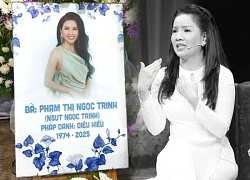Tran Thanh's appearance deteriorated, the first time he appeared to gather after the noisy "artist's life" was turned away by the whole Vbiz

5 | 0 Discuss | Share
Once a student expelled from school, Tran Thanh went to comedy, encroached on filmmaking and succeeded with two of the most popular works in Vietnamese cinema so far. However, the male MC is still criticized for being lightly "marinated" Vietnamese cuisine.
Accordingly, in recent years, films about marriage and family life have become a mainstream of the small screen. The family meal therefore appears a lot. However, not so that Vietnamese cuisine is introduced more skillful, unique and impressive.
On the big screen, the number of Vietnamese films containing cultural and culinary elements is almost scarce. It is difficult for audiences to find a Vietnamese film where Vietnamese food becomes a deliberate highlight.
At the beginning of the Lunar New Year, Tran Thanh's Lady's House dominated the theater with the family story of a woman selling banh chung - played by Le Giang. The culinary element used in the film is clearly a good idea to make a "bait" to blow up the theme of urban culture - which is the film line that made the name of director Tran Thanh.
The film was expected to have more cinematic scenes about banh chung. And the soup cake may have a "soul" in the movie. However, the integration of culinary culture is still not "ripe" enough to satisfy movie lovers.
Despite having an expensive and cinematic opening scene, Banh Canh still cannot "save" the loose connection between food and film content. Even, food only serves the purpose of illustrating the story, providing a background for the development and completely forgotten in the end.
Before that, in 2020, banh mi began to appear on the small screen with Banh Mi King and Mr. Color Bread . In general, the audience reaction was not very positive. The two films were judged as stories that simply used culinary elements as decorations to beautify the setting.
Talking about the image of food in the film, female director Le Do Ngoc Linh - film 11 May Days - shared with the press: "We orient the audience more on other stories, not on the dishes. Like in a meal, we want the audience to pay more attention to the story development around that meal, and the food is just a prop for the characters to interact with each other."
This share is regrettable, because having an admirable cuisine in hand, but Vietnamese dishes have not really brought much impression through movies, like how Korean and Chinese movies have done.
Vietnamese cuisine is rarely considered as a specific "character" in the film, instead, it still appears as a "spice" to contribute to the script.
While the world's filmmaking crews, not only Hollywood but also Asia, have their own distinct imprints on the culinary film map, it seems that Vietnam is still standing still. There are very few works with the theme of Vietnamese cuisine or installed to promote and introduce the essence of Vietnamese cuisine. Movies like The smell of green papaya, The smell of coriander are just memories.
According to producer Vu Thi Bich Lien: "Although returning to food is not as difficult and complicated as making a movie about a medical case or a case, a crime-solving film or a medical topic is easier to attract, more attractive than exploiting. dishes from episode to episode when the filmmaker doesn't know how to be interesting... Talking about food, but in the end, the movie still revolves around the story of society, family, and love."
In 2015, the appearance of Kungfu pho is expected by many to "change blood" for Vietnamese culinary films and promises to make "a story" when aiming to honor the famous pho. Unfortunately, with martial arts elements easily integrated, Kungfu Pho is considered a movie with the color of gangsters and gangsters more than a work of cultural indoctrination.
In recent years, a number of Vietnameseized TV series have paid more attention to the culinary element with beautiful images such as Sticky rice with sticky rice (bun dau), Thuong on sunny day ( bun rieu) . These are two films with many food introduction scenes that received positive feedback.
Both films are impressed by family stories and profound love lessons, along with the interweaving of culinary culture. But the culinary philosophy or "craft" heirloom has not been conveyed deeply.
Indigenous cuisine and culture of a country leaving its borders to retain its distinctive features need to be conveyed through universal and influential stories. This is the general formula that international films apply and maintain to not only reproduce vivid footage but also contribute to the promotion of culinary culture.
It's also time to pay more attention to things that may be considered small, like that!
Tran Thanh smiled and announced "good news" Ba Nu's house earned nearly 500 billion, was mocked by fans for changing 360 degrees  Minh Lợi16:04:50 07/04/2023After days of being criticized and sarcastic by netizens for his statement related to the "aura of the artist", Tran Thanh recently made a move to announce great news to the audience. Specifically, the male MC excitedly posted on his personal page showing off the achievements of...
Minh Lợi16:04:50 07/04/2023After days of being criticized and sarcastic by netizens for his statement related to the "aura of the artist", Tran Thanh recently made a move to announce great news to the audience. Specifically, the male MC excitedly posted on his personal page showing off the achievements of...

5 | 0 Discuss | Share

4 | 0 Discuss | Share

2 | 0 Discuss | Share

4 | 0 Discuss | Share

1 | 0 Discuss | Share

2 | 0 Discuss | Share

1 | 0 Discuss | Share

6 | 0 Discuss | Share

5 | 0 Discuss | Share

2 | 0 Discuss | Share

1 | 0 Discuss | Share

1 | 0 Discuss | Share










3 | 0 Discuss | Report